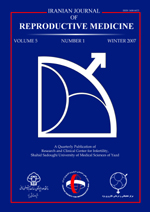
|
International Journal of Reproductive BioMedicine
Research and Clinical Center for Infertility, Shahid Sadoughi University of Medical Sciences of Yazd
ISSN: 1680-6433
EISSN: 1680-6433
Vol. 13, No. 2, 2015, pp. 79-84
|
 Bioline Code: rm15011
Bioline Code: rm15011
Full paper language: English
Document type: Research Article
Document available free of charge
|
|
|
International Journal of Reproductive BioMedicine, Vol. 13, No. 2, 2015, pp. 79-84
| en |
Premature progesterone rise at human chorionic gonadotropin triggering day has no correlation with intracytoplasmic sperm injection outcome
Saharkhiz, Nasrin; Salehpour, Saghar; Tavasoli, Mahboobeh & Aghighi, Ali
Abstract
Background: Premature luteinization during in vitro fertilization was commonly happened before the introduction of GnRh analogues. High level of unwanted progesterone is associated with adverse pregnancy outcome and is thought to be induced by inappropriate LH elevation.
Objective: To evaluate the progesterone level on the day of Human Chorionic Gonadotropin (HCG) triggering in GnRh agonist and antagonist protocols, and its correlation with clinical pregnancy rate and miscarriage rate.
Materials and Methods: One hundred and seven women underwent intracytoplasmic sperm injection with long agonist protocol (n=46) or antagonist protocol (n=61). Blood sample was obtained from each patient for progesterone level measurement in HCG administration day, then patients were divided into two groups according to their serum progesterone levels on the HCG triggering day: progesterone level <1.2 ng/ml, and progesterone level ≥1.2 ng/ml. Clinical pregnancy and miscarriage rates were evaluated as main outcomes and biochemical pregnancy rate and implantation rate were considered as secondary outcomes.
Results: The increased prevalence rate of premature progesterone (progesterone level ≥1.2 ng/ml) in total patients was 13.1% (14/107) and in long agonist protocol group and antagonist protocol group was 15.2% (7/46) and 11.5% (7/61) respectively. Premature progesterone rise had no significant correlation with clinical pregnancy rate in total patients (p=0.174), agonist protocol (p=0.545), and antagonist protocol (p=0.129). Also premature progesterone rise had no significant association with miscarriage rate in total patients (p=0.077), agonist protocol group (p=0.383) and antagonist protocol group (p=0.087).
Conclusion: A significant rise in progesterone levels at the time of HCG triggering doesn’t lead to decrease in pregnancy rate and implantation rate and increase in miscarriage rate.
Keywords
Progesterone rise; HCG triggering; GnRh agonist; GnRh antagonist; Intracytoplasmic sperm injection
|
| |
© Copyright 2015 - Iranian Journal of Reproductive Medicine
Alternative site location: http://www.ijrm.ir
|
|
